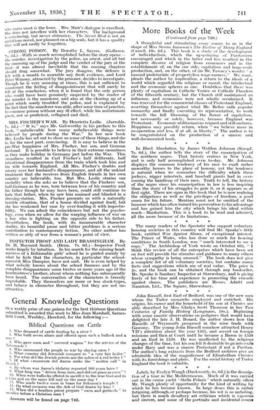MRS. FISCHER'S WAR. By Henrietta Leslie. (Jarrolds.
6d.)—" It is," says Mr. Galsworthy in his preface to this book, - unbelievable how many unbelievable things were believed by people during the War." In her new hook Mrs. Leslie has set out to show us some of these things, and she is, for the most part, convincing. It is easy to believe in the pre-War happiness of Mrs. Fischer, her son, and German husband. It is possible to believe in their extreme casualness as they make holiday in Germany just before the War. This casualness resulted in Carl Fischer's half deliberate, half intentional disappearance from the train which took him and his wife towards England. All Mrs. Fischer's doubts and misery over her husband's disappearance, and all the unkind treatment that she receives from English friends in her own country are believable, too. But Mrs. Leslie strains our credulity when she asks us to believe that the Fischers' son, half-German as he was, torn between love of his country and his father though he may have been, could still continue to hate that father, when he saw him maimed and blinded in a dressing-station. Mrs. Fischer presents us with a naturally terrible situation, that of a house divided against itself, but she has weakened her case by over-loading it with improba- bility. We can admit the coincidences but not the psycho- logy, even when we allow for the warping influence of war on a boy who is fighting on the opposite side to his father. Nevertheless, the book, with its innumerable character studies, its heautiful prose and bitter problems is a serious contribution to contemporary fiction. No other author has written so ably of war from a woman's point of view.








































 Previous page
Previous page